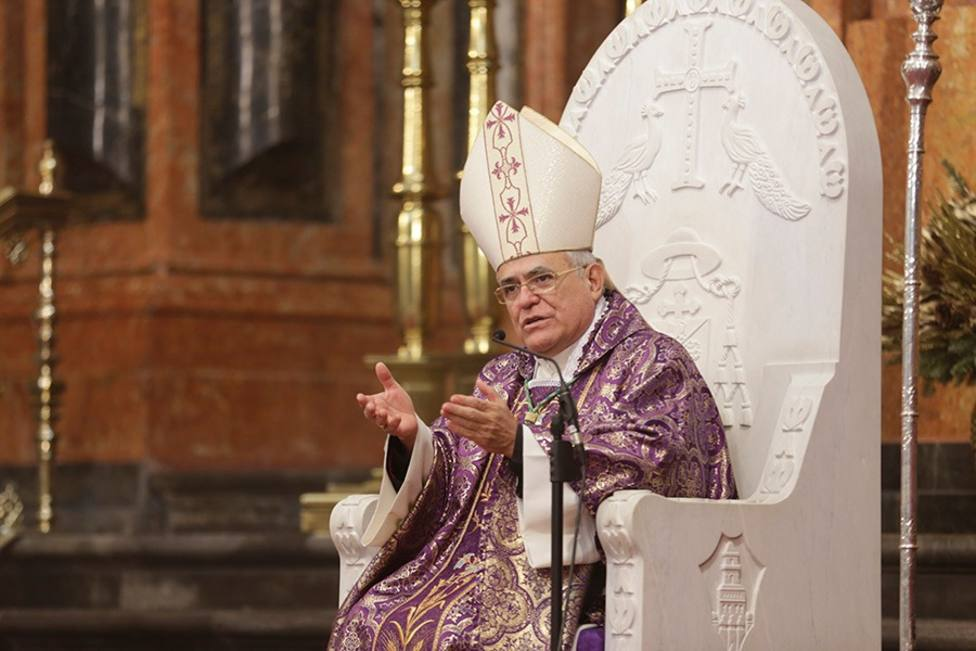Spanish bishop sharply criticises Synodal Path
In a letter, the Bishop of Córdoba pleads for the Vatican's warning to the German Synodal Path to be extended to the whole Church.
The Bishop of Córdoba, Demetrio Fernández, dedicates his last weekly letter before the summer break to the connection between synodality and tradition in the Church: the Church is "synodal by its very nature" because it is communion, assembly. The anointing by the Holy Spirit, which all members of the Church have received, makes all of them prophets: "We are all called to prophesy, to express what the Spirit is saying to His Church today."
Do not confuse the Holy Spirit with your own bird
However, Bishop Fernández points out a possible misunderstanding, because "some people mistake their own bird for the dove of the Holy Spirit". Discernment is needed, which means testing the spirits to see if they come from God or from the evil one. "For the Devil is a master at disguising himself as an angel of light and passing off as divine that which comes from selfishness, destroys and kills."
The first criterion for discernment is the Word of God, which is why the "attitude of listening to the Spirit in prayer, in silence, in contemplation" is necessary. Synods and assemblies are praiseworthy if they contribute to praying more and directing one's life towards God. But if they lead to "words and more words, meetings and encounters at all levels, without converting us", then they are not from God.
In second place, the Bishop of Córdoba mentions tradition, "what the Church has lived throughout the centuries, always and everywhere." It is not a question of "re-inventing the Church and the mission entrusted to her by Christ". For the Church is a gift of Christ's heart; for her he laid down his life so that she might appear "without spot or wrinkle or other blemish" (Ephesians 5:27). The saints are the lifeblood that fills the Church with life. Meetings and synods should include learning about the lives of the saints, calling on them. "If we do not draw from every assembly the conclusion that we are called to holiness and that it is worthwhile to dedicate our lives to it, synods and assemblies will remain barren, booming ore or a noisy drum," the bishop said.
"The Holy Spirit does not err and does not deceive us".
The teaching authority of the Church, "the Pope and the bishops in communion with him", fits into the tradition, he writes further. To leave the "furrow" that over the centuries has formed the doctrine for the salvation of the world and of the people of our time is to "condemn oneself to barrenness". The Holy Spirit cannot simply tell us now something that contradicts what He has said on previous occasions: "The Holy Spirit does not err or deceive us". According to the Second Vatican Council, Tradition, Sacred Scripture and Magisterium are interconnected (Dei Verbum, 10).
As an example, Bishop Fernández cites the fact that Pope John Paul II described the teaching that the Church can only ordain men to the priesthood as definitive. It makes "no sense now to contradict what the Spirit has said to his Church at a certain point in time". The same applies to celibacy, the use of immediate contraception, the blessing of same-sex couples, abortion or respect for life until natural death.
Synods and assemblies, he said, are not there to contradict what the spirit of his Church says, as if the Church were a parliament "that changes laws at the request of the electorate". The Bishop of Córdoba speaks directly about the Synodal Path: The Holy See's warning - "The 'Synodal Path' in Germany does not have the authority to oblige bishops and the faithful to adopt new forms of governance and new orientations of doctrine and morals" - should be applied to the whole Church, he says. The letter ends with a quote from the Letter to the Hebrews: "Jesus Christ is the same yesterday, today and forever. Do not be misled by various foreign teachings" (Hebrews 13:8-9).










.jpeg)

Comments